
Xianming Zhang, PhD
- Assistant Professor, Chemistry and Biochemistry
- Co-director, Centre for Research in Molecular Modeling
- Cross-appointed faculty member, Geography, Planning and Environment
Status: Positions available for graduate studies and undergraduate research
Are you the profile owner?
Sign in to editResearch areas: Organic Contaminants in the Environment; Analytical Environmental Chemistry; Environmental and Molecular Modeling; Chemical Exposure and Risk Assessment; Chemical Management and Regulation
Contact information
Biography
Biography
Education and Training
BSc (Peking), MSc (Toronto), PhD (Toronto), Postdoc (Harvard)
Working Experience
Health Canada; Ontario Ministry of the Environment
Research Interest
- Environmental sources, processes and impact of organic contaminants
- Long-range transport and long-term impact of Persistent Organic Pollutants
- Passive sampling techniques for monitoring trace organics in the environment
- Gas chromatography, liquid chromatography and mass spectrometry for organic analysis
- Model development and applications to simulate environmental processes, exposures and impact of organic contaminants
- Human exposures to organic contaminants in daily life
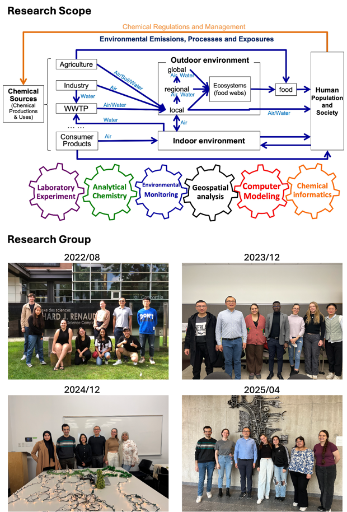
Teaching
CHEM 283 - Air, Water and Soil Processes (Environmental Chemistry)
As an introduction to Environmental Chemistry, this course focuses on the sources, movements, reactions and impact of chemicals in air, water, and soil. The chemistry related to modern environmental issues to be covered include (1) stratospheric chemistry, the ozone layer and ozone holes; (2) ground-level air pollution, particulate matters, and the health impact; (3) chemistry behind fossil fuels, global climate change and renewable energy; (4) chemistry in natural water, water pollution and its impact on aquatic food webs; (5) heavy metals and toxic organic contaminants; and (6) sorption, migration and transformation of chemicals in soil and plant systems. The scientific principles and concepts introduced in this course will help students to better understand and think critically on contemporary environmental issues. The course will also demonstrate how chemistry, as the central science, can help diagnose, prevent, and cure environmental problems the world is facing.
CHEM 312 - Intermediate Analytical Chemistry
An introduction to modern analytical methods of analysis. Instrumental methods are essential for modern analytical laboratory and are used by nearly all branches of chemistry and biochemistry. This course will introduce the basic principles, instrumentation and applications (experimental techniques, qualitative and quantitative data analysis) of various instrumental analysis methods including atomic spectroscopy, and chromatography. Through the course, students will get the principles and applications of many commonly used instrumental analysis methods, become familiar with the structure of the instruments, and have the ability to apply the knowledge they have learned to select appropriate analytical methods and design experimental protocols to solve practical problems in modern analytical laboratories.
CHEM 498/650 - Fate Processes Modeling of Chemicals in the Environment
Quantitative approaches are needed to address the growing concern about contamination of the environment by “man-made” chemicals. Built upon equilibrium partitioning and kinetically controlled mass transfer processes of chemicals between gaseous, liquid and solid phases, various mass balance models used to quantitatively describe processes and impact of chemical contaminants in the environment will be introduced. The underlying concepts and mechanisms of the model simulations are delivered in an intuitive fashion rather than by following rigorous mathematics involved (math beyond that in the introductory chemistry course or computer programming is NOT required). The course aims to provide hands-on experience on building, evaluating, and using various modeling tools to assess environmental fate and risk of chemical contaminants. Knowledge and skills gained from this course are widely used in chemical industry and regulatory agencies to assure environmental safety of chemical products in the market as well as in cutting-edge environmental research. Such applications of environmental fate modeling and risk assessment will be demonstrated with concrete examples. The course is targeted not only for students who are trained to become environmental professionals but also for those who are interested in characterizing environmental fate and risk of chemicals they use or synthesize.
CHEM 205 - General Chemistry I
Basic Concepts of Chemistry; Atoms, Molecules & Ions; Chemical Reactions; Stoichiometry; Bonding & Molecular Structure; Structure of Atoms; Structure of Atoms & Periodic Trends; Valence Bond Theory; Gases & Their Properties.
SCOL 350 - CURRENT ISSUES IN PHYSICAL, BIOLOGICAL AND MATHEMATICAL SCIENCES "Environmental Risk Assessment for Chemical Management and Regulations"
This course provides a conceptual overview of ecological and human health risk assessment. It is designed for students with science background but no prior background in this topic to understand the "state of the art" in envioronmental risk assessment used in science-based chemical management and regulation. The course focuses on core principles and real-world applications. Throughout the course, we will explore the fundamental principles of toxicology and environmental chemistry as they relate to environmental risk of chemicals. Through real-world case studies, you will learn to qualitatively describe the risk assessment process for both humans and ecosystems, highlighting their key differences and similarities. We will also discuss current problems under study and possible future directions of research in the field. The goal is to equip you to critically analyze and articulate the complex relationship between science, policy, and public perception of chemical risks.
Sustainability Co-design Project (Summer 2022)
As per the UNESCO’s Sustainable Development Goals (SDGs), Education for Sustainable Development is a vital element of the 2030 Agenda for Sustainable Development and a key instrument in achieving all the 17 SDGs. Through collaboration that involves curriculum developers from the Centre for Teaching and Learning, faculty-peer mentors, the course instructor and students, the project aims to identify opportunities to infuse sustainability into the course as well as emerging critical themes that can be incorporated into the sustainability curriculum. The team will leverage discipline-specific expertise, sustainable development expertise, and pedagogical expertise in the co-design process. We will develop and integrate sustainable learning outcomes and related learning resources and activities into the course curriculum. The goals to achieve through this project include: (1) Increase sustainability content in CHEM 283 in accordance with the Sustainability in the Curriculum goals; (2) Identify sustainability topics and learning outcomes that will enhance course curriculum and develop engaging sustainability-related content; (3)Help Concordia students identify and value opportunities to intersect sustainability with disciplinary-specific thinking to tackle social, environmental, and economic issues, and meet future challenges; (4) Use a "Students as Partners" approach to develop working partnerships that bring together varied perspectives on how to best integrate sustainability content; (5) Leverage a co-design approach to develop working teams that directly support the creation of the course materials and other deliverables.
Research
Method development and applications of high-resolution mass spectrometry (HRMS) based techniques to analyze organic chemicals of environmental concerns
Hundreds-of-thousands of organic chemicals have been produced and introduced to global market. However, organic compounds that have been measured or assessed for their environmental and health impact only account for only a small fractions of those listed in chemical inventories around the globe. The lesser-known chemicals or transformation products in the environment can possibly pose higher risk to the ecosystem and human population than the well-studied chemicals. With the objective to identify and characterize those lesser-known chemicals with potential environmental concerns, this research will develop and apply instrumental and data processing methods of chemical screening using high-resolution mass spectrometry (HRMS) coupled with gas or liquid chromatography (GC or LC). The approach is often referred as non-targeted analysis.
Related Publications:
Zhang, X.M.; Zhan, F.; Hao, C.; Lei, Y.-D.; Wania, F. Prioritizing Chemical Features in Non-Targeted Analysis through Spatial Trend Analysis: Application to the Identification of Organic Chemicals Subject to Mountain Cold-Trapping. Environ. Sci. Technol. 2025, 59 (6), 3121–3130. https://doi.org/10.1021/acs.est.4c10049.
Liu, Q.F.; Li, L.; Zhang, X.M.; Saini, A.; Li, W.L.; Hung, H.; Hao, C.Y.; Li, K.; Lee, P.; Wentzell, J.J.B.; Huo, C.Y.; Li, S.M.; Harner, T.; Liggio, J. Uncovering global-scale risks from commercial chemicals in air. Nature 2021, 600, 456–461.
Zhang, X.M.; Saini, A.; Hao, C.Y.; Harner T. Passive air sampling and nontargeted screening for organic contaminants in the atmosphere: Opportunities and challenges. TrAC Trends Anal. Chem, 2020, 132, 116052
Zhang, X.M.; Robson, M.; Jobst, K.J.; Pena-Abaurrea, M.; Muscalu, A.; Chaudhuri, S; Marvin, C; Brindle, I.; Reiner E.J.; Helm P. Halogenated organic contaminants of concern in urban-influenced waters of Lake Ontario, Canada: Passive sampling with targeted and non-targeted screening. Environ Pollut. 2020, 114733
Zhang, X.M.; Mell, A; Li F.; Thaysen C.; Musselman, B.; Tice, J.; Vukovic, D.; Rochman, C.; Helm, P.; Jobst, K.J. Rapid fingerprinting of source and environmental microplastics using Direct Analysis in Real Time high-resolution mass spectrometry. Anal. Chim. Acta. 2020, 1100, 107-117
Zhang, X.M.; Di Lorenzo R.; Helm, P.A.; Reiner, E.J.; Muir, D.C.G.; Sled, J.G.; Jobst, K.J.; Compositional space: A guide for environmental chemists on the identification of persistent and bioaccumulative organics using mass spectrometry. Environ. Int. 2019, 104808
Environmental occurrence and fate processes of urban contaminants
Urban area has high population density and for some chemicals their per-capita uses are higher in urban areas. By developing and applying methods that integrating environmental monitoring, controlled laboratory experiment and computational modeling, we aim to characterize sources emissions, environmental transportation and transformation processes for urban contaminants. Currently we focus on chemicals used as additives in vehicle tires, which has become an emerging environmental concern, especially for urban regions.
Related Publications:
Zhang, Xue; Bowman, D. T.; Diamond, M. L.; Helm, P.; Jobst, K. J.; Hao, C.; Kleywegt, S.; Zhang, Z.-F.; Marvin, C.; Zhang, X.M. Contribution of Coal Tar Sources to Polycyclic Aromatic Compounds and Associated Ecological Risk in Lake Ontario Sediments: Inference from a Novel Marker. Environ. Sci. Technol. 2025, 59 (6), 3193–3204. https://doi.org/10.1021/acs.est.4c10360.
Johannessen, C.; Saini, A.; Zhang, X.M.; Harner, T. Tire-Derived Organic Chemicals in Urban Air at the Source-Sector Scale and Guidance on the Application of PUF Disk Passive Air Samplers. ACS ES&T Air 2025.
Johannessen, C.; Liggio, J.; Zhang, X.M., Saini, A.; Harner, T. Composition and transformation chemistry of tire-wear derived organic chemicals and implications for air pollution. Atmos. Pollut. Res. 2022, 13,101533.
Johannessen, C.; Saini, A.; Zhang, X.M., Harner, T. Air monitoring of tire-derived chemicals in global megacities using passive samplers. Environ. Pollut. 2022, 314, 120206.
Environmental sources, fate, bioaccumulations and impact of poly- and perfluoroalkyl substances
Poly- and perfluoroalkyl substances (PFAS) are a class of more than 4000 anthropogenic chemicals that have been widely produced since the 1950s for diverse commercial and industrial applications. There are multiple human exposure pathways in everyday life and the exposures to PFAS have been associated with adverse health effects such as immune suppression and metabolic disruption. Regulatory actions targeting legacy perfluoroalkyl acids (PFAAs) such as perfluorooctane sulfonate (PFOS) have led to shifts chemical production toward PFAS with shorter carbon chains and polyfluoroalkyl. Over a decade after source eliminations of the most hazardous PFAS, the legacy PFAAs are still detected at high concentrations in water and wildlife. PFAAs are not known to degrade in the environment and the associated environmental processes for PFAAs themselves are straightforward. However, there are many well-known and lesser-known precursors that can turn into PFAAs via environmental and biological transformation processes. Our understanding on the environmental processes of PFAA precursors is still limited, which hinders our characterization on how temporal shifts in sources and biogeochemical processes affect environmental exposure and accumulation of PFAS. Our research on PFAS integrates environmental monitoring and modeling and aims to better characterize environmental transport and transformation processes of PFAS mxitures and the influence on long-term impact of PFAS in the environment.
Related Publications:
Zhang, X.M.; Lohmann, R.; Sunderland E.M. Poly- and perfluoroalkyl substances in seawater and plankton from the Northwest Atlantic Margin. Environ. Sci. Technol. 2019, 53, 12348–12356
Hu X.C.; Liddie, J.; Tokranov, A.; Zhang, X.M.; Grandjean, P.; Hart, J.E.; Laden F.; Sun, Q.; Yeung L.W.Y.; Sunderland E.M. Tap water contributions to plasma concentrations of poly- and perfluoroalkyl substances (PFASs) in a nationwide prospective cohort of U.S. women. Environ. Health Perspect. 2019, 127, 067006
Hu, X.C.; Dassuncao, C.; Zhang, X.M.; Grandjean, P.; Nielsen F.; Weihe P.; Webster G.M.; Sunderland E.M. Profiles of poly- and perfluoroalkyl substances (PFASs) in human serum as fingerprints of major exposure sources. Environ. Health. 2018, 17, 11
Zhang, X.M.; Zhang, Y.X.; Dassuncao, C.; Lohmann, R.; Sunderland E.M. North Atlantic deep water formation inhibits high Arctic contamination by continental perfluorooctane sulfonate (PFOS) discharges. Global Biogeochem.Cycles. 2017, 31, 1332–1343
Yeung, L.W.Y.; Dassuncao, C.; Mabury, S.; Sunderland, E.M.; Zhang, X.M.; Lohmann, R. Vertical profiles, sources and transport of PFASs in the Arctic Ocean. Environ. Sci. Technol. 2017, 51, 6735–6744
Dassuncao, C.; Hu, X.C.; Zhang, X.M.; Bossi, R; Dam, M; Mikkelsen, B; Sunderland, E.M. Rapidly changing poly- and perfluoroalkyl substances (PFAS) in North Atlantic pilot whales indicate dominant contribution of atmospheric precursors to past exposures. Environ. Sci. Technol. 2017, 51, 4512-4521
Zhang, X.M.; Lohmann, R.; Dassuncao, C.; Hu, X.C.; Weber, A.K.; Vecitis, C.; Sunderland E.M. Source attribution of poly- and perfluoroalkyl substances (PFASs) in surface waters from Rhode Island and the New York Metropolitan Area. Environ. Sci. Technol. Lett. 2016, 3, 316–321.
Bhavsar, S.P.; Zhang, X.M.; Guo, R.; Braekevelt, E.; Petro, S.; Gandhi, N.; Reiner, E.J.; Bronson, R.; Tittlemier, S.A. Cooking fish is not effective in reducing exposure to perfluoroalkyl and polyfluoroalkyl substances. Environ. Int. 2014, 66, 107–114.
Awad, E.; Zhang, X.M.; Bhavsar, S.P.; Petro, S.; Crozier, P.W.; Reiner, E.J.; Fletcher, R.; Tittlemier, S.A.; Braekevelt, E. Long-term environmental fate of perfluorinated compounds after accidental release at Toronto Airport. Environ. Sci. Technol. 2011, 45, 8081–8089.
The global chemical industry has grown rapidly over the past several decades. An estimated 350,000 are industrial chemicals in commerce. Less than 10% of these substances account for more than 99% of the total global chemical production volume. Assessment of the chemical substances based on potential environmental fate and exposure is challenging given limited information on uses, emissions, physicochemical properties and toxicity of most industrial chemicals in commerce. Cost-effective modeling simulations (in silico approaches) provide an alternative starting point for tiered chemical risk assessment approaches when such data are limited. Over the past decade, these in silico approaches have been applied to large lists of substances included in European and North American chemical inventories to identify those potentially a concern for environmental and/or human exposure. In our research, we develop new methods (e.g. machine learning) and integrate existing in silico approaches, which are applied to screen chemicals of high environmental concerns from the global chemical inventories.
Related Publications:
Norouzi, S.*; Nahmiach, N.; Perez, G.; Zhu, Y.; Peslherbe, G. H.; Muir, D. C. G.; Zhang, X.M. Molecular Docking for Screening Chemicals of Environmental Health Concern: Insight from a Case Study on Bisphenols. Environ. Sci.: Proc. Impact. 2025, 27, 3192-3207
Liu, Q.; Liu, R.; Zhang, X.M.; Li, W.; Harner, T.; Saini, A.; Liu, H.; Yue, F.; Zeng, L.; Zhu, Y. Oxidation of Commercial Antioxidants Is Driving Increasing Atmospheric Abundance of Organophosphate Esters: Implication for Global Regulation. One Earth 2023, 6 (9), 1202–1212.
Zhang, X.M.; Sun, X.F.; Jiang, R.F.; Zeng, E.Y.; Sunderland, E.M.; Muir, D.C.G. Screening for potential persistent and bioaccumulative organics from the Inventory of Existing Chemical Substances in China. Environ. Sci. Technol. 2020, 54, 7398–7408.
Sun, X.F.; Zhang, X.M.; Muir D.C.G. Zeng, E.Y.; Identification of potential POPs/PBTs-like chemicals by a deep learning approach based on 2-D structural features. Environ. Sci. Technol. 2020, 54, 8221–8231.
Muir, D.C.G.; Zhang, X.M.; de Wit, C. Vorkamp, K; Wilson, S. Identifying further chemicals of emerging Arctic concern based on ‘in silico’ screening of chemical inventories. Emerg. Contam. 2019, 5, 201–210
Zhang, X.M.; Brown, T.N.; Wania, F.; Heimstad, E.S.; Goss, K.U. Assessment of chemical screening outcomes based on different partitioning property estimation methods. Environ. Int. 2010, 36, 514–520.
Passive sampling of organic contaminants in the environment
As a simple and cost-effective environmental monitoring technique, passive sampling has been gaining increasing popularity for measuring organic contaminants in air and water. Passive sampling minimizes the influence of episodic events and provides time-integrated concentrations of contaminants in the environment. Passive sampling has facilitated the investigations on sources, emissions, long-range atmospheric transport of organic contaminants in the environment. In our research on passive air sampling, we have conducted a series of investigations on the influence of wind, temperature, sampler configurations, and chemical diffusion within the sampling media on passive air sampling rate. Results of the investigation have led to new design of the passive air sampler. We also applied passive samplers to study fate and distribution of chemicals in air and water and highlighted the influence of urban sources to chemicals in ambient air, wastewater and receiving water. Recently, in collaboration with scientists at the Ontario Ministry of the Environment and Environment and Climate Change Canada, we have applied non-targeted approach to passive samplers and demonstrated the feasibility of using the sampler to discover lesser-known organic contaminants in the environment.
Related Publications:
Zhang, X.M.; Saini, A.; Hao, C.Y.; Harner T. Passive air sampling and nontargeted screening for organic contaminants in the atmosphere: Opportunities and challenges. TrAC Trends Anal. Chem, 2020, 132, 116052
Zhang, X.M.; Robson, M.; Jobst, K.J.; Pena-Abaurrea, M.; Muscalu, A.; Chaudhuri, S; Marvin, C; Brindle, I.; Reiner E.J.; Helm P. Halogenated organic contaminants of concern in urban-influenced waters of Lake Ontario, Canada: Passive sampling with targeted and non-targeted screening. Environ Pollut. 2020, 114733
Zhang, X.M.; Barnes J.; Lei, Y.D.; Wania, F. Semi-volatile organic contaminants in the Hawaiian atmosphere. Environ. Sci. Technol. 2017, 51, 11634–11642
Zhang, X.M.; Hoang, M.; Lei, Y.D.; Wania, F.; Exploring the role of the sampler housing in limiting uptake of semivolatile organic compounds in passive air samplers. Environ. Sci.: Processes & Impacts 2015, 17, 2006–2012.
Zhang, X.M.; Brown, T.N.; Ansari, A.; Yeun, B.; Kondo, A.; Lei, Y.D.; Wania, F. Effect of wind on the chemical uptake kinetics of a passive air sampler. Environ. Sci. Technol. 2013, 47, 7868–7875.
Krogseth, I.S.; Zhang, X.M.; Lei, Y.D.; Breivik, K.; Wania; F. Calibration and application of a passive air sampler (XAD-PAS) for volatile methyl siloxanes. Environ. Sci. Technol. 2013, 47, 4463–4470.
Zhang, X.M.; Wania, F. Modeling the uptake of semi-volatile organic compounds by passive air samplers: Importance of mass transfer processes within the porous sampling media. Environ. Sci. Technol. 2012, 46, 9563–9570.
Zhang, X.M.; Wong, C.; Lei, Y.D.; Wania, F. Influence of sampler configuration on the uptake kinetics of a passive air sampler. Environ. Sci. Technol. 2012, 46, 397–403.
Zhang, X.M.; Tsurukawa, M.; Takeshi, N.; Lei, Y.D.; Wania, F. Sampling medium side resistance to uptake of semi-volatile organic compounds in passive air samplers. Environ. Sci. Technol. 2011, 45, 10509–10515.
Indoor chemical sources, fate and exposures
Higher concentrations of many synthetic organic chemicals are measured indoors than outdoors. This implies that the indoor environment is an important exposure route of these compounds. Human population are vulnerable to exposure indoors because of low, but significant emissions over time from products and materials containing synthetic organic chemicals such as flame retardants and plasticizers. As well, minimal removal rates in the indoor environment such as restricted air exchange rates, contribute to elevated indoor concentrations. Our vulnerability to elevated indoor concentrations is exacerbated because of the time we spend indoors. For example, on average, North Americans spend 90% of their time indoors and in Canada, this increases to 96-98% during winter where energy saving measures have made our indoor environments more air tight. Thus, the importance of the indoor environment to exposure drives our investigation to better understand main emission sources that give rise to indoor concentrations and to characterize chemical processes that influence chemical concentrations and exposures indoors.
Related Publications:
Kvasnicka J.; Hubal E.C.; Ladan J.; Zhang, X.M.; Diamond M.L. Transient multimedia model for investigating the influence of indoor human activities on exposure to SVOCs. Environ. Sci. Technol. 2020, 54, 10772–10782
Zhang Z.F.; Zhang X; Zhang X.M.; Liu L.Y.; Li Y.F.; Sun W. Indoor exposure and health risk of formaldehyde, toluene, xylene and total volatile organic compounds derived from an extensive monitoring campaign in Harbin, a megacity of China. Chemosphere. 2020. 126324
Li L.; Westgate J.N.; Hughes L.; Zhang X.M.; Givehchi B.; Toose L.; Armitage J.M.; Wania, F.; Egeghy P.; Arnot J.A. RAIDAR-ICE: A model for risk-based screening and prioritization of human exposure to chemicals from near-field sources. Environ. Sci. Technol. 2018, 52, 14235–14244
Shin, H.M.; Ernstoff, A.; Arnot, J.; Wetmore B.A.; Csiszar S.A.; Fantke P.; Zhang, X.M.; McKone T.E.; Jolliet O.; Bennett, B.H. Risk-based high-throughput chemical screening and prioritization using exposure models and in vitro bioactivity assays. Environ. Sci. Technol. 2015, 49, 6760–6771.
Zhang, X.M.; Arnot, J.A.; Wania, F. Model for screening-level assessment of near-field human exposure to neutral organic chemicals released indoors. Environ. Sci. Technol. 2014, 48, 12312–12319.
Zhang, X.M.; Diamond, M.L.; Robson, M.; Harrad, S. Sources, emissions, and fate of polybrominated diphenyl ethers and polychlorinated biphenyls indoors in Toronto, Canada. Environ. Sci. Technol. 2011, 45, 3268–3274.
Zhang, X.M.; Diamond, M.L.; Ibarra, C.; Harrad, S. Multimedia modeling of polybrominated diphenyl ether emissions and fate indoors. Environ. Sci. Technol. 2009, 43, 2845–2850.
Harrad, S.; Ibbara, C.; Robson, M.; Melymuk, L.; Zhang, X.M.; Diamond, M.; and Douwes, J.Polychlorinated biphenyls in domestic dust from Canada, New Zealand, United Kingdom and United States: Implications for human exposure. Chemosphere 2009, 76, 232–238.
Bioaccumulations of organic contaminants and associated human exposure via fish consumption
Fish consumption contributes to numerous nutritional and health benefits to human health. However, concerns exist on the exposure to the elevated concentrations of contaminants accumulated in fish and the health risk involved in fish consumption. Although fish consumption comprises only a small portion of human diet, it is the major pathway of human exposure to various contaminants such as persistent organic pollutants (POPs) and mercury. The extent of exposure and the adverse health effect largely depend on the contaminant concentrations in the fish consumed. Our research on this topic aims to better understand factors that influence bioaccumulations of organic contaminants to fish and human exposures to organic contaminants via fish consumption.
Related Publications:
Zhang, X.M.; Lohmann, R.; Sunderland E.M. Poly- and perfluoroalkyl substances in seawater and plankton from the Northwest Atlantic Margin. Environ. Sci. Technol. 2019, 53, 12348–12356
Liu X.T.; Wu Y.; Zhang, X.M.; Shen L.; Adams D.; Marler H.; Watts, B.; Chen D. Identification and determination of two novel Dechlorane analogues in Peregrine Falcon eggs and shark livers from North America. Environ. Sci. Technol. 2019, 53, 3419–3428
Ma, Z.Y.; Peng, H.; Jin Y.R.; Zhang, X.M.; Xie X.Y.; Jian K.; Liu, H.L.; Su, G.Y.; Tang, S.; Yu, H.X. Multigenerational effects and demographic responses of zebrafish (Danio rerio) exposed to organo-bromine compounds. Environ. Sci. Technol. 2018, 52, 8764–8773
Dassuncao, C.; Hu, X.C.; Zhang, X.M.; Bossi, R; Dam, M; Mikkelsen, B; Sunderland, E.M. Rapidly changing poly- and perfluoroalkyl substances (PFAS) in North Atlantic pilot whales indicate dominant contribution of atmospheric precursors to past exposures. Environ. Sci. Technol. 2017, 51, 4512-4521
Zhang, X.M.; Gandhi, N.; Bhavsar, S.P. Persistent organohalogens in paired fish fillet and eggs: Implications for fish consumption advisories. J. Agri. Food Chem. 2016, 64, 2832–2840.
Bhavsar, S.P.; Zhang, X.M.; Guo, R.; Braekevelt, E.; Petro, S.; Gandhi, N.; Reiner, E.J.; Bronson, R.; Tittlemier, S.A. Cooking fish is not effective in reducing exposure to perfluoroalkyl and polyfluoroalkyl substances. Environ. Int. 2014, 66, 107–114.
Zhang, X.M.; Gandhi, N.; Bhavsar, S.P.; Ho, L.S.W. Effects of skin removal on contaminant levels in salmon and trout filets. Sci. Total Environ. 2013, 443, 218–225.
Anthropogenic organic contaminants in the global ocean
Organic contaminants in the ocean encompass a wide range of substances, from naturally occurring compounds to those introduced by human activities. However, anthropogenic organic contaminants, such as industrial chemicals, pose a significant threat to marine ecosystems. These pollutants can accumulate in marine food webs, and ultimately impact human health through seafood consumption. Therefore, it is crucial to understand their sources, pathways, and effects, enabling the development of effective strategies to mitigate their impact and protect the health of our oceans.
Related Publications:
Zhu, F.-J.; Lu, X.-M.; Jia, J.-W.; Zhang, Xue; Xing, D.-F.; Cai, M.-H.; Kallenborn, R.; Li, Y.-F.; Muir, D. C. G.; Zhang, Z.-F.; Zhang, X.M. Spatial Variations of Atmospheric Alkylated Polycyclic Aromatic Hydrocarbons Across the Western Pacific to the Southern Ocean: Unexpected Increasing Deposition. Environ. Sci. Technol. 2025.
Zhang, Xue; Li, L.; Xie, Z.; Ma, J.; Li, Y.-F.; Cai, M.; Ren, N.-Q.; Kallenborn, R.; Zhang, Z.-F.; Zhang, X.M.; Muir, D. C. G. Exploring Global Oceanic Persistence and Ecological Effects of Legacy Persistent Organic Pollutants across Five Decades. Science Advances 2024, 10 (39), eado5534. https://doi.org/10.1126/sciadv.ado5534.
Zhang, Xue; Zhang, Z.-F.; Zhang, X.M.; Zhu, F.-J.; Li, Y.-F.; Cai, M.; Kallenborn, R. Polycyclic Aromatic Hydrocarbons in the Marine Atmosphere from the Western Pacific to the Southern Ocean: Spatial Variability, Gas/Particle Partitioning, and Source Apportionment. Environ. Sci. Technol. 2022, 56 (10), 6253-6261.
Zhang, Xue; Zhang, X.M.; Zhang, Z.-F.; Yang, P.-F.; Li, Y.-F.; Cai, M.; Kallenborn, R. Pesticides in the Atmosphere and Seawater in a Transect Study from the Western Pacific to the Southern Ocean: The Importance of Continental Discharges and Air-Seawater Exchange. Water Research 2022, 217, 118439.
Zhang, Xue; Zhang, Z.-F.; Zhang, X.M.; Yang, P.-F.; Li, Y.-F.; Cai, M.; Kallenborn, R. Dissolved Polycyclic Aromatic Hydrocarbons from the Northwestern Pacific to the Southern Ocean: Surface Water Distributions, Source Apportionment and Air-Seawater Exchange. Water Research 2021, 117780.
Zhang, X.M.; Lohmann, R.; Sunderland, E. M. Poly- and Perfluoroalkyl Substances in Seawater and Plankton from the Northwestern Atlantic Margin. Environmental Science & Technology 2019, 53 (21), 12348–12356.
Zhang, X.M.; Zhang, Y.; Dassuncao, C.; Lohmann, R.; Sunderland, E. M. North Atlantic Deep Water Formation Inhibits High Arctic Contamination by Continental Perfluorooctane Sulfonate Discharges. Global Biogeochemical Cycles 2017, 31 (8), 1332–1343.
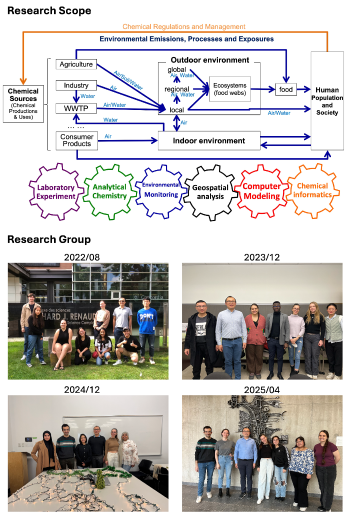

MSc student Joshua taking urban surface water samples
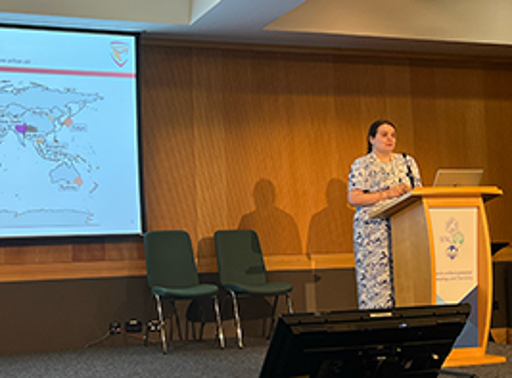
PhD student Cassandra presenting her research on airborne chemicals of tire origin at a conference
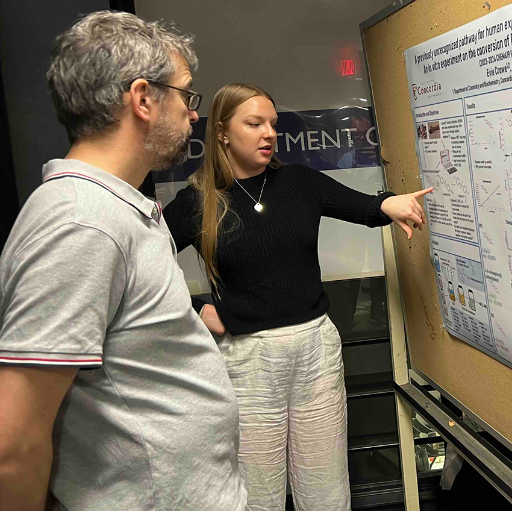
Undergraduate Student Evie Presenting her CHEM419 project
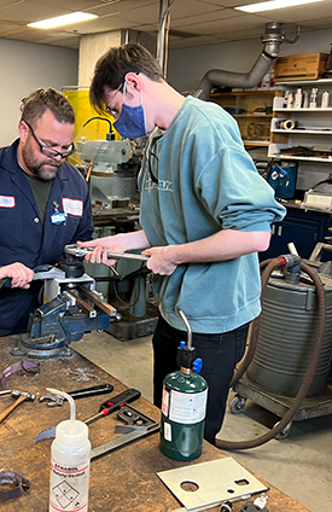
Undergraduate student James working in the machine shop to build a customized lab device
Publications
See Google Scholar
Service
• Member of the Scientific Advisory Committee on Pest Control Products (SAC-PCP) for Health Canada (06/2022- )
• Committee for undergraduate award at the Department of Chemistry and Biochemistry, Concordia University (09/2021-)
• Undergraduate Research (CHEM419/450) Coordinator, Department of Chemistry and Biochemistry, Concordia University (05/2025-)
• Advisory committee for Centre for Biological Applications of Mass Spectrometry (CBAMS), Concordia University (09/2021-)
• Member, EcotoQ - Centre de Recherche en Écotoxicologie du Québec
HQP Training
Current
MSc and PhD students
• Aida Asem Yousefi (PhD student, 09/2025- )
• Richard Opoku (PhD student, 09/2025- )
• Ameerah Ngai (MSc student, 01/2025- )
• Yuliia Sologub (MSc student, 01/2025- )
• Faraz Ileaee (MSc student, 09/2024- )
• Samira Norouzi (PhD student, 09/2023- )
• Cassandra Johannessen (PhD student, 05/2022- )
Undergraduate research students
• Rayaan Kazim (CHEM450, 09/2025-04/2026, cosupervised with Prof. Peslherbe)
• Ankush Bagiana (CHEM419, 09/2025-04/2026)
• Amanda Clarke (CHEM419, 05/2025-12/2025)
Visiting students/Interns (funded by various student exchange/internship programs)
• Kaishi Loh (09/2025-12/2025, Visiting MSc student)
• Dinh Hieu Truong (09/2025-12/2025, Visiting PhD student)
Past
MSc and PhD students
• Joshua Osagu (MSc student, 09/2021-12/2023)
Undergraduate research students
• Pierre-Alexandre Berube (CHEM419, 05/2025-08/2025)
• Juliette Gennaro (EcotoQ intern and NSERC USRA, 01-08/2025)
• Diane Maldonado Bravo(EcotoQ intern and CHEM450 05/2024-05/2025)
• Asma Syed (CHEM419, 05/2024-12/2024)
• Evie Crowe (CHEM419, 09/2023-05/2024)
• Tania Cretella (SCOL290, 09/2023-12/2023)
• Noah Nahmiach (SCOL490, 09/2023-05/2024)
• Zoey Davis (SCOL391, 09/2023-05/2024)
• Paula Gomez (CHEM419, 01/2023-8/2023)
• Yue Ma (Research assistant, summer 2023)
• James Barnwell (CHEM419, 09/2022-05/2023)
• Kevin Koueiki (Research assistant, winter 2023)
• Immanuel Tablas (CHEM419, 09/2022-12/2022)
• Guzal Riskulova (Research assistant, summer 2022)
• Han Vu (CHEM450, co-supervise with Prof. Gilles Peslherbe, 01/2022-12/2022)
• Anaelle Treesha Ragaven (CHEM419, 09/2021-04/2022)
Visiting Professor
• Dr Bayan Khalaf (Assistant Professor, Arab American University, Palestinian Quebecer Science Bridge Program)
Visiting students/interns (funded by various student exchange/internship programs)
• Bohdan Kurlov (Undergraduate intern, 06-09/2025)
• Xue Zhang (Visiting PhD student, 03/2023-08/2024)
• Meng Qin (Visiting PhD student, 03/2023-03/2024)
• Rohit Srivastava (Undergraduate intern, 06-08/2024, cosupervised with Prof Peslherbe)
• Zaid Shekhani (Undergraduate intern, 06-08/2024, cosupervised with Prof Peslherbe)
• Conor Byrne (Undergraduate intern, 06-08/2023, cosupervised with Prof Peslherbe)
• Catherine Mckeown (Undergraduate intern, 06-08/2023, cosupervised with Prof Peslherbe)
• Hangzhang Liu (Undergraduate intern, 06-08/2022, cosupervised with Prof Peslherbe)

